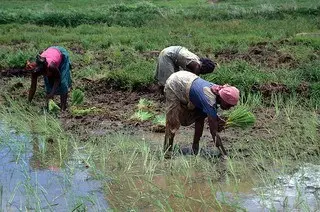A gene that gives rice plants deeper roots could triple yields during droughts, according to a new study by Japanese scientists
The study, which was recently published in Nature Genetics magazine, suggested that by pointing roots down instead of sideways, the Deeper Rooting 1 (DRO1) gene results in rice plant roots which are almost twice as deep as those of standard rice varieties.
The study’s lead author, Yusaku Uga, a researcher at Japan’s National Institute of Agrobiological Sciences, said, “If rice adapts to or avoids drought conditions using deeper roots, it can get water and nutrients from the deep soil layers.”
Uga and his team found that in moderate drought conditions, the yield of rice with DRO1, which naturally occurs in more than 60 rice varieties, was double that of the shallow-rooted rice variety. Under severe drought conditions, this increased to 3.6 times greater, according to the study.
“The most important point is that we had rice grains produced under drought conditions. When rice crops just tolerate drought, they cannot get water and nutrients, resulting in a kind of survival mode,” Uga said.
For the study, the research team crossbred a rice variety carrying DRO1 with a shallow-rooted variety and then bred the offspring together to produce a rice crop in which DRO1 was uniformly present.
The International Rice Research Institute (IRRI) has estimated that an additional eight to ten million tonnes of rice will be needed each year to keep rice prices affordable at approximately US$300 per tonne. Finding a drought-resistant variety of rice may be key to attaining this goal, the researchers said.
Sophie Clayton, head of communications at IRRI, commented, “Drought is the most widespread and damaging of all environmental stresses. In some states in India, severe drought can cause as much as 40 per cent yield loss [in rice crops]. Moreover, with the onset of climate change, droughts may become more frequent and more severe.”





